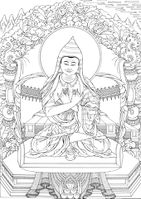TA ra nA tha: Difference between revisions
No edit summary |
No edit summary |
||
| Line 27: | Line 27: | ||
|tolExcerpt=In the history of the Jonang tradition Tāranātha is second in importance only to Dölpopa himself. He was responsible for the Jonang renaissance in U-Tsang during the late sixteenth and early seventeenth centuries, and the widespread revitalization of the zhentong teachings. Like his previous incarnation, Kunga Drolchok, Tāranātha practiced and taught from many different lineages and was nonsectarian in his approach to realization. He was also one of the last great Tibetan translators of Sanskrit texts. The abbot of Jonang Monastery, he emphasized the practice of the Sakya teachings of Lamdre and the esoteric instructions of the Shangpa Kagyu, but he specially focused on the explication of the Kālacakra Tantra and the practice of its Six-branch Yoga as the most profound of all the teachings given by the Buddha. It is clear in his writings that Tāranātha considered Dölpopa to be the ultimate authority in matters of doctrine and practice. | |tolExcerpt=In the history of the Jonang tradition Tāranātha is second in importance only to Dölpopa himself. He was responsible for the Jonang renaissance in U-Tsang during the late sixteenth and early seventeenth centuries, and the widespread revitalization of the zhentong teachings. Like his previous incarnation, Kunga Drolchok, Tāranātha practiced and taught from many different lineages and was nonsectarian in his approach to realization. He was also one of the last great Tibetan translators of Sanskrit texts. The abbot of Jonang Monastery, he emphasized the practice of the Sakya teachings of Lamdre and the esoteric instructions of the Shangpa Kagyu, but he specially focused on the explication of the Kālacakra Tantra and the practice of its Six-branch Yoga as the most profound of all the teachings given by the Buddha. It is clear in his writings that Tāranātha considered Dölpopa to be the ultimate authority in matters of doctrine and practice. | ||
|PosBuNayDefProv=Definitive | |PosBuNayDefProv=Definitive | ||
|PosAllBuddha=Yes | |||
|PosWheelTurn=Third Turning | |PosWheelTurn=Third Turning | ||
|PosYogaMadhya=Madhyamaka | |||
|PosZhenRang=Zhentong | |PosZhenRang=Zhentong | ||
|PosAnalyticMedit=Meditative Tradition | |||
|PosEmptyLumin=Tathāgatagarbha as the Emptiness That is an Implicative Negation (with enlightened qualities) | |PosEmptyLumin=Tathāgatagarbha as the Emptiness That is an Implicative Negation (with enlightened qualities) | ||
|IsInGyatsa=No | |IsInGyatsa=No | ||
}} | }} | ||
Revision as of 13:09, 26 November 2019
| PersonType | Category:Classical Tibetan Authors |
|---|---|
| MainNameTib | ཏཱ་ར་ནཱ་ཐ་ |
| MainNameWylie | tA ra nA tha |
| MainNameSkt | Tāranātha |
| AltNamesTib | ཀུན་དགའ་སྙིང་པོ་ |
| AltNamesWylie | kun dga' snying po |
| YearBirth | 1575 |
| YearDeath | 1634 |
| BornIn | kha rag |
| TibDateGender | Female |
| TibDateElement | Wood |
| TibDateAnimal | Pig |
| TibDateRabjung | 10 |
| ReligiousAffiliation | Jonang |
| EmanationOf | Kunga Drolchok |
| StudentOf | Buddhagupta · Ninth Karmapa Wangchuk Dorje |
| BDRC | https://www.tbrc.org/#!rid=P1428 |
| Treasury of Lives | http://treasuryoflives.org/biographies/view/Taranatha/TBRC_P1428 |
| IsInGyatsa | No |
| PosBuNayDefProv | Definitive |
| PosAllBuddha | Yes |
| PosWheelTurn | Third Turning |
| PosYogaMadhya | Madhyamaka |
| PosZhenRang | Zhentong |
| PosAnalyticMedit | Meditative Tradition |
| PosEmptyLumin | Tathāgatagarbha as the Emptiness That is an Implicative Negation (with enlightened qualities) |
| Other wikis |
If the page does not yet exist on the remote wiki, you can paste the tag |

